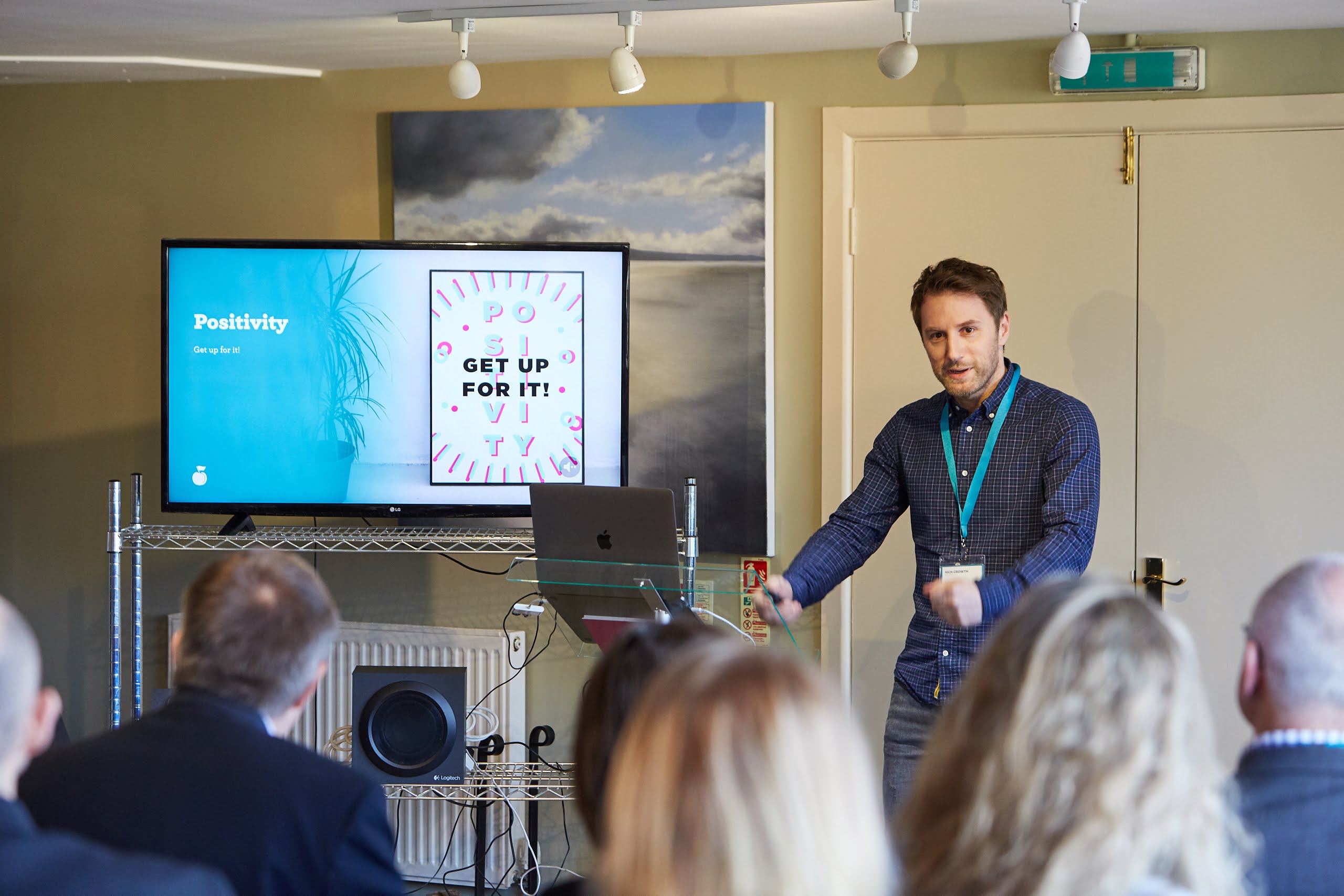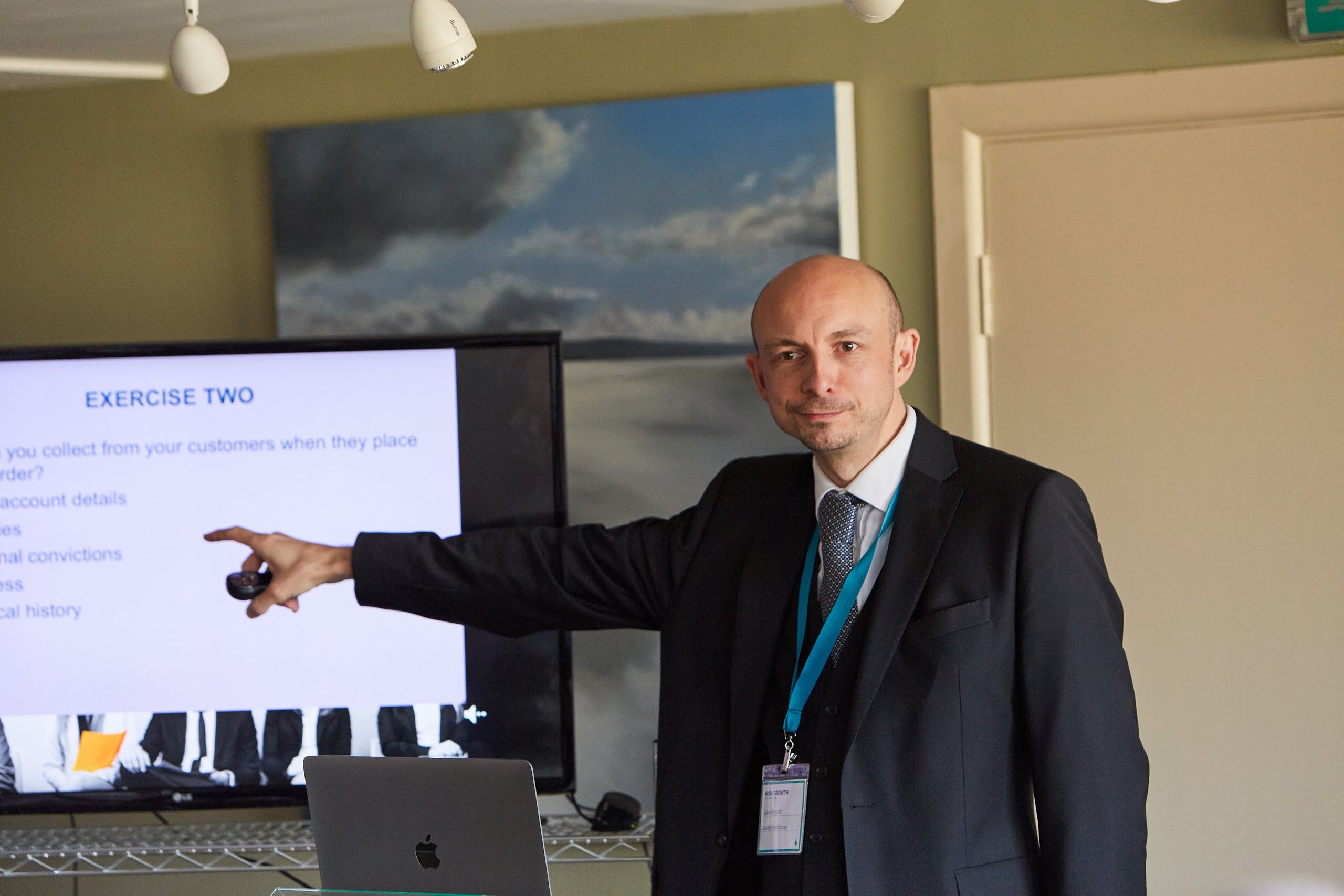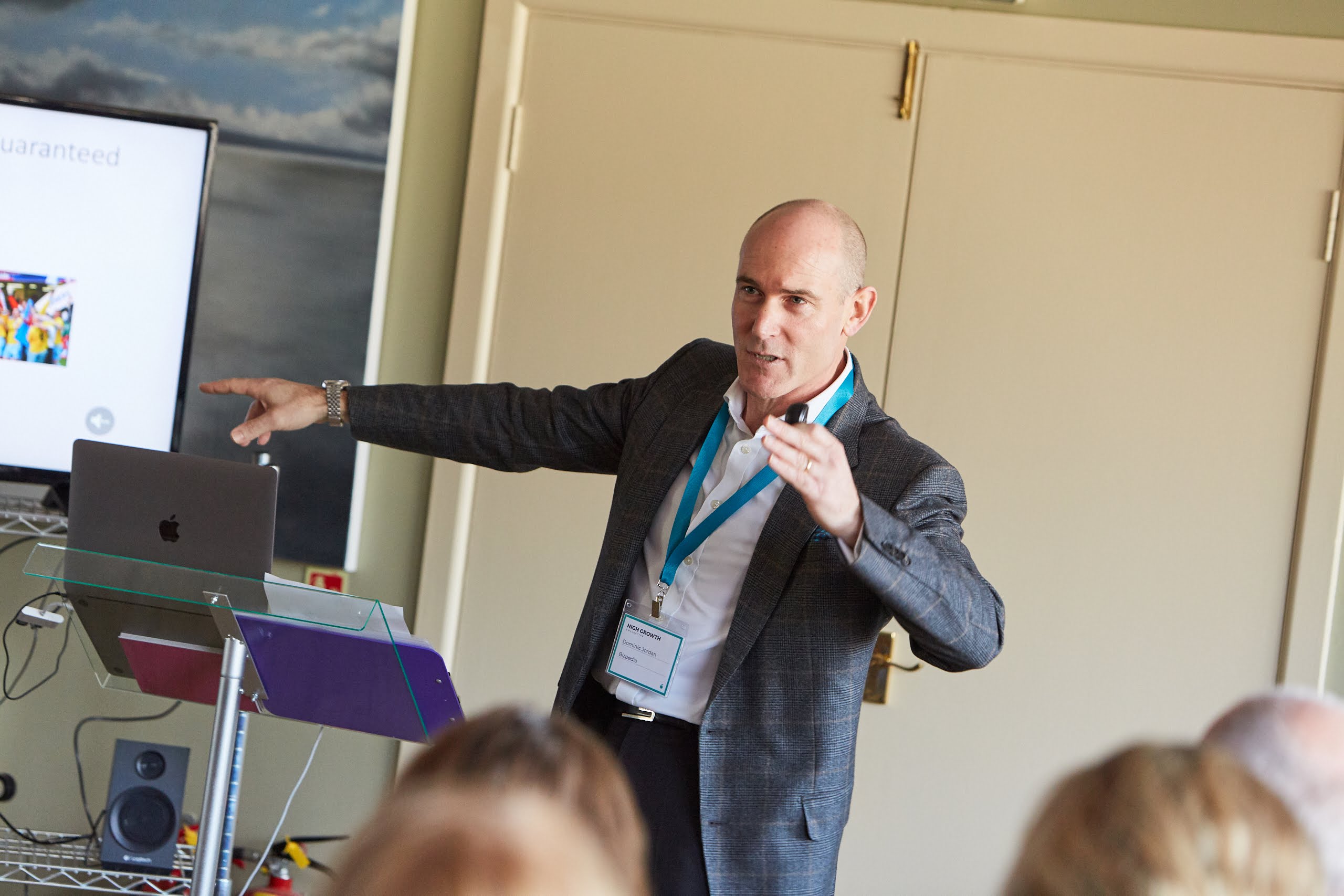High Growth Collective: Culture, GDPR & Crystal Palace…
This month’s High Growth Collective (HGC), held at a packed Bird & Carter was an absolute stellar example of the kind of event we’re curating here. We had a crucially informative session about GDPR, James shared his wisdom about culture in your business and it just wouldn’t be HGC without an amazing story of the rollercoaster ride that is business and entrepreneurialism.
Leveraging Culture
James Read, Founder & Director, Giant Peach

Giant Peach is a workplace where culture is key. We conduct ourselves according to it, create work according to it, engage new clients, employ new people and even plan our physical space around it. Our culture is who we are, and we put effort into understanding and cultivating it.
What culture is not:
- Bean bags
- Free food
- A slide in your office
- Nerf gun fights
What makes a good agency culture?
Culture is the manifestation of your company and the shared values of the team. Your departments are the engine of the business and your culture is the lubricant.
To understand your culture and get the best out of it, you first must identify your core values (this bit is crucial). Your values set the tone for your culture; these are a few of ours:
- Positivity: Get up for it!
- Family: Giant Peach is a collaborative community
- Excellence: We’re committed to going one step further to deliver first class service
But what if you haven’t identified core values or a culture? Well, culture is organic, it’s people, so as a business you’ll already have a culture, an atmosphere, regardless of intention. The problem here is that if you haven’t set the agenda, and you aren’t working with it, it might not be serving your values and growth.
Your culture reflects your vision, it’s your journey and it helps get you there; a well-embraced culture defines and enables success. Get the most out of it by focusing on it, make it part of your strategy:
- Spend time and invest in it on a regular basis
- HOT comms (honest, open and two-way communication)
- Marketing from the inside out
Emotional Investment
Engagement sparks investment. When your team connect with your culture, they want to give back. It’ll also help find the right people to grow your business. In the recruitment process, 3 in 4 people want to know what makes the company attractive. Share your values with them, explain the culture – it sets expectations and if they relate, you know you’ve got a possible fit.
Culture helps take care of your team, it sets the tone and the trust and when your people feel they know where they stand and are invested in the business, they go above and beyond – and it’s the difference that determine how customers feel about your brand.
Setting the tone:
- Be yourself
- Highlight employees that are performing well
- Build team socialisation – take em out!
- Share your culture – show clients what’s going on behind the scenes
If you need any cultural help or branding in general, we’re always happy to have a look at your business and see where you can be injecting the energy – give us a shout!
GDPR
Luke English, Laceys Solicitors

GDPR is a topic we’ve already looked at in some detail in our blog ‘Preparing for GDPR’, but it’s always good to recap and make sure we’ve got it covered, right?
Pretty much every business is holding some form of personal data on their clients and customers, including things like photographs, contact details, complaints, CCTV footage etc. Luke came along to High Growth Collective to talk us through what we need to know.
GDPR comes into force on the 25th of May.
Definitions of roles:
- Data Controller: determines the purpose and means of processing the personal data
- Data Processor: only processes personal data in accordance with the data controller’s instructions
- Once a subcontractor is able to determine how they store / delete / deal with personal data they too become a data controller
- Even if you don’t own the data you could still be a processor
When can you collect data?
- If you have consent
- It is necessary for performance of contract
- It’s necessary for a legal obligation
- When it’s crucial in protecting the vital interests of someone
- If it is necessary for exercising the legitimate interests of the data controller / third party (unless individual’s interests or rights override these)
- When processing for literary, journalistic or academic purposes
Certain types of data, such as racial origin or sexual orientation falls within the category of sensitive personal data and is given a higher level of protection. You can collect that data when:
- You have the explicit consent of individual
- It is necessary to protect the vital interests of someone
- It’s necessary for establishment, exercise or defence of a legal claim
- The data subject has already made the data public
- You need to comply with some listed types of law
For marketers consent is key, though a contractual relationship may mean you don’t have to ask for their consent. And it’s important to remember that, legally, you can’t destroy records if you need them for legal compliance ie HMRC. For those of you with ecommerce platforms – you must only collect data relevant to the order, so have a think about what you’re currently asking.
The bottom line of GDPR is transparency. You need to let people know what you’re doing with their data and you need to keep it secure and confidential. All physical records need to be locked away, especially overnight.
Luke’s 8 Basic Data Principles:
- Process data lawfully, fairly and in a transparent manner
- Collect and process data for specified, explicit and legitimate purposes
- Data to be adequate, relevant and limited to what is necessary for above purposes
- Data to be accurate and kept up to date
- Data to be kept for no longer than is necessary
- Kept secure and confidential
- Processed in accordance with the subject’s rights
- Only transferred outside the EEA where permitted
The right to be forgotten
One of the updates to legislation is the right to erasure aka the right to be forgotten. So first up, make sure you take them off your marketing database, but do add them to a new folder / database with everyone who has asked to be removed, so you have a record of it.
Consent
You’ll need to get re-affirmation or consent again. Something along the lines of “We’re looking to be GDPR compliant now, we need you to click this link”. Don’t pester people – just send this request once.
Next Steps
- Make sure everyone in your organisation is aware
- Evaluate your current processing and procedures
- Ask yourself – do you need to appoint a Data Protection Officer?
- Start to review privacy notices
- Do you need to start obtaining consent?
- Do you need to conduct impact assessments?
- Start collecting records
- Review agreements with data processors / sharers
- Start to review / prepare your data protection policy
- Keep updated!
A Story of Success, Failure and Hard Work
Dominic Jordan, previous CEO of Crystal Palace Football Club

Dominic opened with Glad All Over by The Dave Clark Five, the theme tune and anthem for Crystal Palace football club. His family owned the football club for 10 years and over that time he learned a thing or two! He shared those things with us and what a ride it was!
Humble beginnings
Dominic was born in Croydon, 10 mins from Crystal Palace ground and lived 1 minute away from the club, where his dad still lives now. Their lives revolved around the club, they were totally devoted.
Dominic’s mum worked during the day as a manicurist for Vidal Sassoon and his dad worked nights as a printer, taking care of Dominic and his brother Simon during the day. His dad had a revolutionary approach to his boys’ sporting career at that time and paid attention to nutrition, psychology and equipment. His dedication and forward thinking meant both Dominic and Simon played football semi-professionally.
Work experience
Higher education wasn’t for Dominic and he sent his CV to anyone and everyone, landing a job at a construction company. His work ethic paid off and he was offered the chance to qualify in construction, after which he began working with Barratts at a time of exciting change and regeneration in the Docklands.
Big steps
With their dad’s commitment and dedication heavily influencing them, both Dominic and Simon then set up their own business: Dominic in construction and Simon in the communication industry. Simon formed the Pocket Phone Shop and planned 40 stores on the outskirts of London. Struggling to find builders, he approached Dominic and they went on to to work together as partners, creating 200 stores and finally selling to Vodafone for £75 million. Dominic was 30 and Simon 32.
Crystal Palace
It was at that point that Crystal Palace found themselves in administration. Dominic and Simon had an opportunity to give back to their community that desperately needed someone to make a difference. The boys bought the club.
Their idea was to take the broken club to the Premiership. Says Dominic “The club needed fixing, it was broken, it was like half a dozen SME’s mashed together.” In 2000 they had a 5 year plan to get it back on its feet and get them in the Premiership. In 2004 they played the the Final Championships playoff with 72 thousand people attending and a guaranteed £100 million.
Hard times
After that high things took a turn. They had to make changes and brought in a new manager. But it soon became clear this wasn’t a straightforward venture. 2008 arrived, the landscape changed and they found themselves putting a lot of money into the businesses. Despite having changed the fortune of the club and making waves of difference in the community, it was a hard time. Dominic believes it was because they didn’t have a robust strategy, they hadn’t prepared to be flexible and they didn’t have a vision for the next step. They had to let the club go.
Gratitude & future
Dominic has learnt so much from that time, and he now measures his life on how much pleasure he provides his family, his employees and his customers. He’s excited and looking forward to the next 40 years. Dominic says “We’ve got loads to be thankful for.”
He now runs a high end business club, through a partnership with entrepreneur Josh Williams. Josh had vision and values that resonated with Dominic, they went into business and and now have 8 regions for the business clubs. Dominic really is a powerhouse of entrepreneurialism but everyone can learn from his story. He left us with the following advice:
7 lessons / values I learnt or earnt
- Have a Vision: if you can see it, you can create it
- Preparation: fail to prepare, prepare to fail
- Hard Work: if it’s worth having it’s worth working hard for
- Commitment: if you’re interested you might do it, if you’re committed you will do it
- Don’t let the naysayers stop you: your values become your destiny
- Never Give Up: I didn’t come this far to come this far!
- Give Back: that’s your legacy!
If you’d like to speak at or come along to a future High Growth Collective, get yourself on our email list and get inspired.